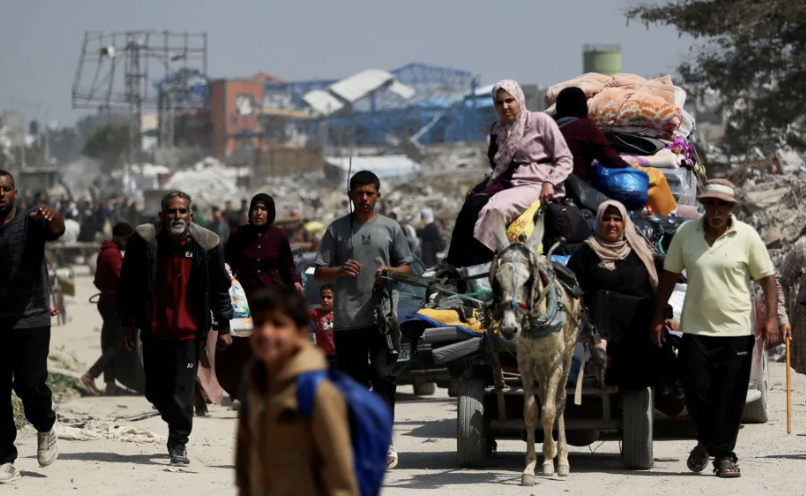
 Palestinians leave their homes after Israeli army issued evacuation orders for neighbourhoods across Gaza. /FILE
Palestinians leave their homes after Israeli army issued evacuation orders for neighbourhoods across Gaza. /FILE
Inside the pediatric ward of Nasser Hospital, 35-year-old Samia Ashour sits beside her infant son, Ibrahim.
He is 50 days old and weighs less than two kilograms. His limbs barely twitch. His eyes don't track movement.
His mother, gaunt and grief-stricken, rocks him gently, as if willing life back into his frail body.
"I breastfeed him every day," she said softly. "But he's wasting away in front of me."
Ashour, a mother of four, endured her entire pregnancy undernourished, surviving on a single sparse meal each day.
"That was all we had," she said. "There was never enough food. No vegetables. No protein. No milk."
When Ibrahim was born, he weighed less than one kilogram. He needs formula milk, but there is none.
"Even if I had money, there's nothing to buy. The crossings are closed. The shelves are empty."
The Kerem Shalom border crossing -- the main lifeline for aid into Gaza -- was sealed by Israeli authorities on March 2.
Since then, not a single truck carrying food, medicine, or baby formula has entered the Palestinian enclave.
Israel says the closure came after Hamas refused to extend a temporary ceasefire and release Israeli hostages.
But inside Gaza, where more than 2 million people -- nearly half of them under 18 -- are trapped, the blockade has triggered what aid groups now describe as a man-made famine.
Hunger is sweeping through neighborhoods like a second wave of war.
"What did these children do to suffer like this?" Ashour cried, her voice rising with desperation.
"Is being born Palestinian now a death sentence?"
Just 25 kilometers north, in Gaza City, another mother echoed the same agony.
"My daughter doesn't cry. She doesn't move. Only her eyes open and close," said 29-year-old Reham Khamis.
Her baby, Rana, is 20 days old and receiving emergency care at Al-Ahli Arab Hospital.
"She is starving. We all are." With baby formula nearly impossible to find and clean water even scarcer, families are being forced to mix unsafe substitutes with contaminated water -- an act of desperation that often causes more harm than good.
"This is no longer a war between armies," Khamis said. "This is a war on children."
Health authorities in Gaza report that over 60,000 children are now at risk of severe complications from malnutrition.
Many, like Ibrahim and Rana, are newborns who have yet to gain weight since birth -- an ominous sign of their declining condition.
Dr. Ahmed al-Farra, head of pediatrics at Nasser Hospital, said many newborns are suffering from low birth weight and stunted growth.
In their desperation, parents are resorting to whatever formula they can find -- including those meant for older children, which are often nutritionally inadequate and, at times, even harmful for infants.
Meanwhile, the United Nations Children's Fund (UNICEF) issued a stark warning over the weekend, calling the halt in aid the longest since the war began and the most devastating for children.
"Without immediate humanitarian access, more children will die -- not from bombs, but from hunger and disease," the organization said.
Nearly 10,000 infants under six months of age are in urgent need of proper feeding support, it added.
Childhood vaccination campaigns have also ground to a halt.
Health authorities warn of the looming threat of disease outbreaks like polio and measles -- viruses that prey on weakened immune systems and spread quickly in overcrowded shelters.
Aid workers say Gaza is approaching a point of no return.
Even if aid trucks were allowed in tomorrow, the damage to thousands of children may already be irreversible. For mothers like Ashour and Khamis, the wait is unbearable.
"I just want him to live," Ashour whispered, cradling her son. "I gave him life. And now I'm watching it slip away."











